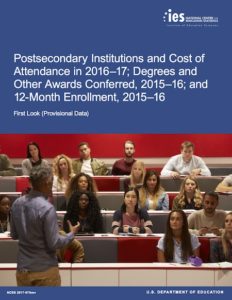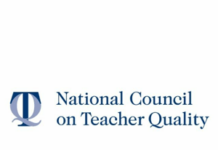 A new report from the U.S. Department of Education offers data on degree attainments during the 2015-16 academic year. The data is broken down by racial and ethnic group. During the 2015-16 academic year, African Americans earned 570,354 degrees and certificates at degree-granting institutions in the United States. This was 11.7 percent of all awards.
A new report from the U.S. Department of Education offers data on degree attainments during the 2015-16 academic year. The data is broken down by racial and ethnic group. During the 2015-16 academic year, African Americans earned 570,354 degrees and certificates at degree-granting institutions in the United States. This was 11.7 percent of all awards.
During the 2015-16 academic year, African Americans were awarded 128,295 associate’s degrees. This was 12.7 percent of all associate’s degree awards. For bachelor’s degrees, African Americans earned 185,711 degrees during the 2015-16 academic year. This was 9.7 percent of all bachelor’s degrees.
There were 81,347 master’s degrees awarded to African Americans in the 2015-16 academic year. This was 10.4 percent of all master’s degrees awarded that year.
There were 6,911 African Americans who earned doctoral degrees in professional practice fields such as medicine, law, dentistry, veterinary medicine, etc. They earned 6.5 percent of all such degrees. Another 5,264 African Americans earned doctoral degrees in research fields. This was 7.6 percent of all doctorates awarded in these fields.
The full report, Postsecondary Institutions and Cost of Attendance in 2016-17; Degrees and Other Awards Conferred: 2015-16; and 12-Month Enrollment: 2015-16: First Look, may be downloaded by clicking here.












This Department of Education report points out the persistent challenges that many African Americans and other minorities face as it relates to degree attainment. The critical factors that negatively impact students of color have not changed and in some cases have gotten worse because of educational, economic, and other policies that are in place. If degree attainment at all levels is to significantly increase, these seemingly intransigent policies must change to effectively help those who aspire to postsecondary achievement.
This present President push for school choice will help to produce better prepared Blacks and black African-Americans for higher education. This mentioned group will need to produce high paying degree holders from their Ethnic group in the US. Nigerians, per se, is as black as Wesley Snipes and their educational prowess out performs Whites and Asians. Take a look at what they study towards.
Jah and Jahnes love.
Thanks again JBHE for sharing the findings of a very important study about the achievement gap or rate of degrees earned by race. It is clear that the gap widens at the Bachelors, Masters, and Doctoral levels. I am concerned about the implications of this data, in other words, are blacks not being encouraged to pursue higher learning and/or degrees or more specifically, what is hindering our achievement at the Bachelors, Masters, and Doctoral levels. In my experience, there are problems with lack of institutional support which includes academic help, and acknowledgment of anti-black racism, coping strategies for first-generation University attendees and so forth. On my part, I face a lot of problems because I am homeless, with no support from family and friends. But, I am hopeful that I will complete my Doctorate within the next few years. Blessed love.
I’m homeless too and living rent-free in transitional housing actually beats living with family that was always trying to squeeze a $ out of me. I attended a Tour for Diversity in Medicine conference and one of the medical students (who was a black woman) suggested we attend medical school away from family our families were needy. Black families are more dysfunctional and that more than racism is the reason behind our lack of success relative to other races academically. Also, speaking a former substitute teacher, black kids aren’t that intellectual and/or academically-inclined.
I don’t know where you are in this state of homelessness, but if I know maybe we could seek you some help. Don’t be shamed.